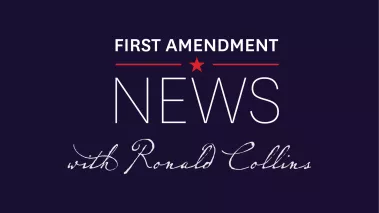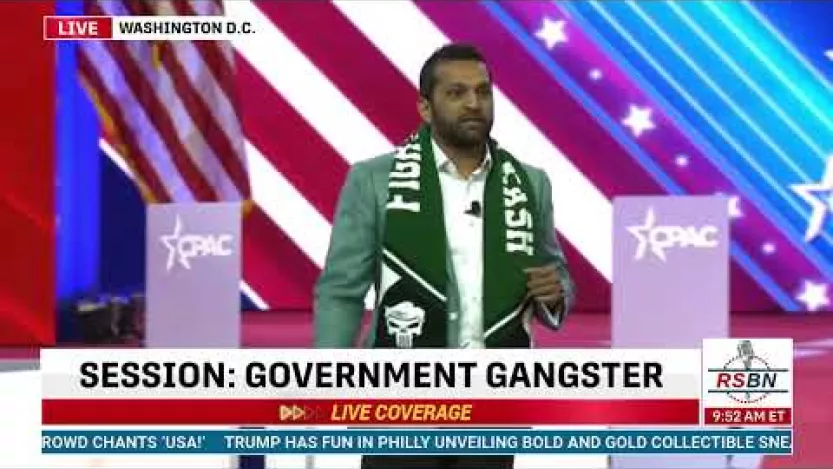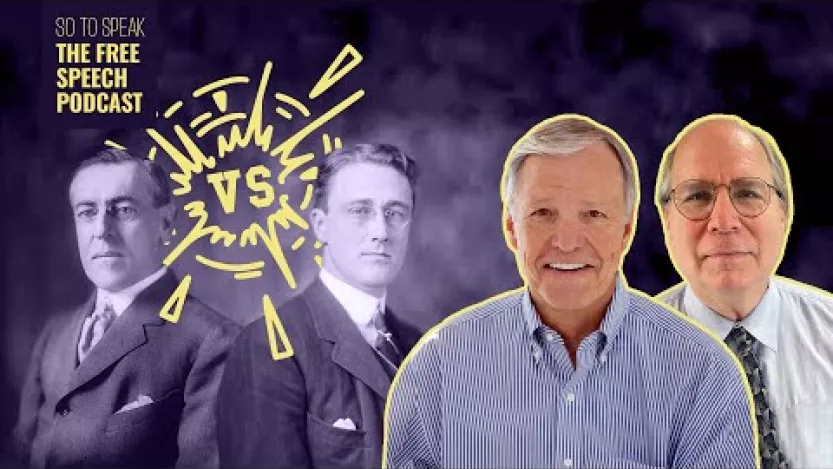Table of Contents
Trump’s FBI director pick Kash Patel: A clear and present danger to freedom of the press — First Amendment News 449

First Amendment News is a weekly blog and newsletter about free expression issues by Ronald K. L. Collins and is editorially independent from FIRE.
Retribution is in the air. . . . [Kash Patel’s] pledge to ‘go out and find the conspirators, not just in government but in the media,’ is so overt that it demands to be taken seriously. — David Remnick 11-30-24
Former national security adviser John Bolton compared Kash Patel, President-elect Trump’s nominee to head the FBI, to one of the former Soviet Union’s most feared secret police chiefs, Lavrentiy Beria. — The Hill, 12-01-24
Full-bodied criticism of the press was part of the fabric of colonial America as the Federalists and Anti-Federalists battled it out. With the advent of President John Adams and his support of the Alien and Sedition Acts of 1798, however, criticism turned to censorship and prosecution. Merely recall the persecution of Benjamin Bache. To prevent just such forms of political retaliation, the First Amendment was crafted to erect a firewall between the government and its critics and thus render criticism immune from persecution.

Enter Kash Patel, President-elect Donald Trump’s pick to be the director of the FBI. Here is a man who is not shy when it comes to his intense views on the mainstream press. Consider, for example, the following statement from his 2023 book “Government Gangsters”:
“[T]he media is not just one-sided, but liars. . . . What exactly is the ‘Deep State’ that I speak of? Some of the characters . . . are elected leaders. Others are yellow journalists in the media who serve as peddlers of propaganda and disinformation at the behest of the ruling elites.”
Then consider what Patel said last February when speaking before an energized audience at the Conservative Political Action Conference:
“[T]here is no deep state, there are no government gangsters without some of their corrupt actors in the media who continue to print the lies about Donald Trump’s success about our movement, and about our America First movement.”
As his incendiary momentum built up, and donning his “K$H”-branded scarf, the spirited Trump loyalist added:
“We [must] collectively join forces to take on the most powerful enemy that the United States has ever seen, and no it’s not Washington, D.C., it’s the mainstream media and these people out there in the fake news. That is our mission!”

They’re ‘dead serious’
Earlier this week, New York Times reporters Glenn Thrush, Elizabeth Williamson, and Adam Goldman wrote:
Mr. Patel’s maximum-volume threats to exact far-reaching revenge on Mr. Trump’s behalf have endeared him to his boss and Trump allies . . . Mr. Patel, who was working in the Pentagon during the 2020 election, has consistently promoted Mr. Trump’s false claims that President Biden stole the election.
He was so active in promoting falsehoods, and so wired in with the White House, that his superiors at the Defense Department took notice.
Gen. Mark A. Milley, then the chairman of the Joint Chiefs, summoned Mr. Patel and another Trump-allied aide to warn them against violating the sacrosanct separation of the military from politics, according to an account in The New Yorker.
Over the past four years, Mr. Patel has continued to echo Mr. Trump’s election falsehoods — and has gone so far as to suggest he would target journalists who dispelled the false claims if he ever returned to power.
Consider how Patel might respond to such statements in light of the following:
- Sarah Fortinsky, “Bannon, Patel say Trump ‘dead serious’ about revenge on media: ‘We’re going to come after you,’” The Hill (Dec. 5, 2023)
Steve Bannon and Kash Patel claimed that former President Trump is “dead serious” about exacting revenge on his political enemies if he wins a second term as president, and they warned members of the media to take the threats seriously, saying Tuesday, “We’re going to come after you.” In an episode of Bannon’s “War Room” podcast, Bannon and Patel, two of Trump’s close allies, pledged to prosecute members of the media who “lied’ about the 2020 presidential election results — falsely suggesting Trump truly won.
“We will go out and find the conspirators — not just in government, but in the media,” Patel told Bannon. “Yes, we’re going to come after the people in the media who lied about American citizens, who helped Joe Biden rig presidential elections.”
“We’re going to come after you. Whether it’s criminally or civilly, we’ll figure that out. But yeah, we’re putting you all on notice, and Steve, this is why they hate us. This is why we’re tyrannical. This is why we’re dictators,” Patel said, suggesting those were terms used sometimes to describe them. “Because we’re actually going to use the Constitution to prosecute them for crimes they said we have always been guilty of but never have.”
By contrast, over at Fox News such attacks on the press and Trump’s critics were left out of the Kash Patel story and calls for “reforms.” See, for example, Stephanie Price, “Trump FBI pick should take these concrete steps to restore trust: Former FBI Agent,” Fox News (Dec. 2).
The fate of a federal shield law
- Jon Allsop, “What the FBI Has Done, and Kash Patel Could Do,” Columbia Journalism Review (Dec. 2)
Trump himself has explicitly said that reporters who publish leaked information should go to jail; whoever eventually leads his FBI may not have written a sycophantic children’s book, but is likely to have to share this and related views, or at least pay lip service to them. As such, a perhaps more important fight than the one over Patel’s nomination concerns a piece of legislation that has already passed the House with bipartisan backing but has languished in the Senate: the PRESS Act, a so-called “shield law” that would curb the surveillance of journalists and protect them against efforts to make them identify their sources.
Shield laws exist at the state level, but a federal equivalent has never been passed — despite decades of trying, ever since the Hoover-era surveillance of members of the press was revealed.
Unsurprisingly, Trump opposed the latest bill’s passage before he takes office: last week he wrote on his Truth Social platform that “REPUBLICANS MUST KILL THIS BILL!” Journalists should advocate the opposite. Trump’s win and comments like Patel’s make doing so urgent. Even if Kamala Harris had won, the bill would be a good idea.
Critical Commentaries

If Kash Patel becomes the director of the FBI, it will mark the apotheosis of the concerted attack on the independent media which has been brewing for more than 20 years. Vengeance and retribution will be the order of the day, and without the PRESS Act, coupled with the likely repeal of Merrick Garland’s DOJ’s regulations on obtaining information from the news media, we will be back in the maelstrom of the Nixon administration’s surveillance of journalists.
In addition to direct attacks on media entities and individual reporters who challenge the Trump administration, we can expect bogus, but rigorous, investigations and prosecutions not only of leakers, but of the recipients of those leaks.
This is not a time for the news media to be complacent, much less compliant. We must shout from the rooftops that this is not only unconstitutional, but undermines freedom for everyone. These attacks are not an “inside baseball” situation. All those in the media must communicate to the public that the survival of a free press is essential to everyone in our democracy.

Government punishment of disinformation is fundamentally antithetical to democracy. As the Supreme Court declared in United States v. Alvarez (2012), which struck down a federal law criminalizing certain false statements, “Our constitutional tradition stands against the idea that we need Oceania’s Ministry of Truth.”
As current debates illustrate, one person’s cherished truth is another’s despised “fake news.” Speech that critics seek to suppress as disinformation almost never consists of objectively verifiable facts alone, but also involves subjective matters of interpretation and analysis. After all, speakers who intentionally or recklessly utter false statements of fact that directly cause specific harm may constitutionally be punished under existing laws, such as those that ban fraud, defamation, and perjury. In contrast, our legal system scrupulously avoids punishing statements that go beyond straightforward facts and incorporate matters of interpretation or opinion. As the Supreme Court declared in Gertz v. Robert Welch, Inc. (1974): “Under the First Amendment there is no such thing as a false idea. However pernicious an opinion may seem, we depend for its correction not on the conscience of judges and juries but on the competition of other ideas.”
While some may bristle at the notion that government is prohibited from silencing “false ideas,” surely the alternative is far worse. If government were permitted to determine which ideas should be deemed “false” and hence punishable, any ideas that depart from prevailing orthodoxy — including those critiquing government policy — would be jeopardized. Such a course could not be more inimical to the most fundamental precepts that undergird our democratic republic. As the Supreme Court eloquently declared in its landmark 1943 decision in West Virginia Board of Education v. Barnette: “If there is any fixed star in our constitutional constellation, it is that no official, high or petty, can prescribe what shall be orthodox in politics, nationalism, religion, or other matters of opinion.”
Related
- Rachel Sully, “John Bolton compares Kash Patel to Soviet secret police leader,” The Hill (Dec. 1)
- John Bowden, “Will Donald Trump use Kash Patel to attack his critics and the First Amendment?” The Independent (Dec. 1)
- Elaina Plott Calabro, “The Man Who Will Do Anything for Trump,” The Atlantic (Aug. 26)
Patel is author of a ‘brilliant roadmap,’ says Trump
- “Government Gangsters: The Deep State, the Truth, and the Battle for Our Democracy” (Post Hill Press, 2023) (table of contents here) (documentary forthcoming)
“A brilliant roadmap highlighting every corrupt actor, to ultimately return our agencies and departments to work for the American People . . . we will use this blueprint to help us take back the White House and remove these Gangsters from all of Government!” – Donald J. Trump

The highest levels of government have been infiltrated by an anti-democratic Deep State that can be defeated by refocusing our national security mission and relentlessly defending the truth.
A sinister cabal of corrupt law enforcement personnel, intelligence agents, and military officials at the highest levels of government plotted to overthrow a president. Even after they failed, they continue to secretly pull the levers of power without any accountability to the American people. This isn’t the synopsis of a fictional spy thriller. This is what is actually happening in the United States government.
In Government Gangsters, Kash Patel — a former top official in the White House, the Department of Defense, the Intelligence Community, and the Department of Justice — pulls back the curtain on the Deep State, revealing the major players and tactics within the permanent government bureaucracy, which has spent decades stripping power away from the American people and their elected leaders. Based on his firsthand knowledge, Patel reveals how we can defeat the Deep State, reassert self-government, and restore our democracy.
- Kash Patel and Laura Vincent, “The Plot Against the King,” (Beacon of Freedom Publishing House, 2022) (Children’s book: “(a fantastical retelling of Hillary’s horrible plot against Trump”))
Patel’s Credentials
- University of Richmond (BA)
- University College London (certificate in international law)
- Pace University (JD)
Patel’s Experience
- Senior aide to congressman Devin Nunes
- Federal public defender
- Federal prosecutor working on national security cases
- Legal liaison to the United States Armed Forces
- Served as a U.S. National Security Council official
- Senior advisor to the acting director of National Intelligence
- Chief of staff to the acting United States secretary of defense during the first Trump presidency
‘So to Speak’ podcast: Wilson vs. FDR on free speech

- “Wilson vs. FDR: Who was worse for free speech?” FIRE (Nov. 25)
Woodrow Wilson or Franklin D. Roosevelt: which president was worse for free speech?
In August, FIRE posted a viral X thread, arguing that Woodrow Wilson may be America’s worst-ever president for free speech. Despite the growing recognition of Wilson’s censorship, there was a professor who wrote a recent book on FDR’s free speech record, arguing that FDR was worse.
Representing the Wilson side in our discussion is Christopher Cox, author of the new book, “Woodrow Wilson: The Light Withdrawn.” Cox is a former member of the House of Representatives, where he served for 17 years, including as chair of the Homeland Security Committee. He is currently a senior scholar in residence at the University of California, Irvine.
Representing the FDR side is professor David T. Beito, a research fellow at the Independent Institute and professor emeritus at the University of Alabama. He is the author of a number of books, his latest being “The New Deal’s War on the Bill of Rights: The Untold Story of FDR’s Concentration Camps, Censorship, and Mass Surveillance.”
More in the news
- Eugene Volokh, “Court Upholds N.J. Law That Lets ‘Certain Public Officials’ Demand That Private Entities Stop Disclosing Their Home Addresses,” The Volokh Conspiracy (Dec. 2)
- Eugene Volokh, “DePaul Professor Who Wrote Anti-Palestinian Article, Was Censured by Faculty Council, Loses Contract, Defamation, and Discrimination Claim,” The Volokh Conspiracy (Nov. 30)
- Susanna Granieri, “ACLU of Florida Attorney Michelle Morton on the Pro-Abortion Ad Controversy,” First Amendment Watch (Nov. 27)
- “CNN Wants North Carolina Lt. Governor’s Defamation Lawsuit Thrown Out,” First Amendment Watch (Nov. 25)
- Sarah McLaughlin, “Gov. Greg Abbott’s order ‘hardening state government’ against China is dangerously hard to parse,” FIRE (Nov. 22)
2024-2025 SCOTUS term: Free expression and related cases
Cases decided
- Villarreal v. Alaniz (Petition granted. Judgment vacated and case remanded for further consideration in light of Gonzalez v. Trevino, 602 U. S. ___ (2024) (per curiam))
- Murphy v. Schmitt (“The petition for a writ of certiorari is granted. The judgment is vacated, and the case is remanded to the United States Court of Appeals for the Eighth Circuit for further consideration in light of Gonzalez v. Trevino, 602 U. S. ___ (2024) (per curiam).”)
Review granted
Pending petitions
- 360 Virtual Drone Services LLC v. Ritter
- Turco v. City of Englewood, New Jersey
- Coalition Life v. City of Carbondale
Petitions denied
- R.J. Reynolds Tobacco Co. v. FDA
- Smith v. Stillie
- No on E, San Franciscans Opposing the Affordable Care Housing Production Act, et al. v. Chiu
- Henderson v. Texas
- Nassif v. United States
Last scheduled FAN
FAN 448: “D. John Sauer, the next Solicitor General — the government’s SCOTUS lawyer in First Amendment cases”
This article is part of First Amendment News, an editorially independent publication edited by Ronald K.L. Collins and hosted by FIRE as part of our mission to educate the public about First Amendment issues. The opinions expressed are those of the article’s author(s) and may not reflect the opinions of FIRE or Mr. Collins.
Recent Articles
FIRE’s award-winning Newsdesk covers the free speech news you need to stay informed.

FIRE statement on immigration judge’s ruling that deportation of Mahmoud Khalil can proceed

FIRE comment to FCC calls for review of regulations that may violate the First Amendment

FIRE welcomes Allison Hayward to board of directors


